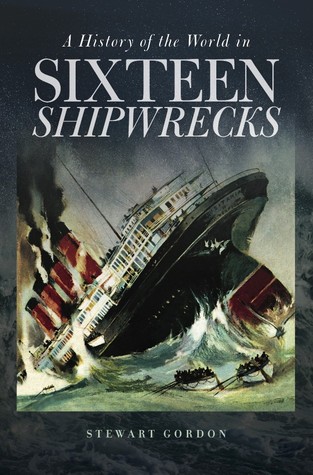
Today's post is on The History of the World in Sixteen Shipwrecks by Stewart Gordon. It is 270 pages long including notes and an index. It is published by ForeEdge. The cover has a painting of the sinking of the Lusitania. the intended reader is someone who likes history, ships, and how they changed the world. There is no sex, no language, and no violence in this book. There Be Spoilers Ahead.
From the dust jacket- Shipwrecks as hidden windows on the history of globalization.
Stories of disasters at sea, whether about Roman triremes, the treasures fleet of the Spanish Main, or the great transatlantic ocean liners. Stories of disasters at sea fire the imagination as little else can, whether the subject is a historical wreck—the Titanic or the Bismark—or the recent capsizing of a Mediterranean cruise ship. Shipwrecks also make for a new and very different understanding of world history. A History of the World in Sixteen Shipwrecks explores the ages-long, immensely hazardous, persistently romantic, and still-ongoing process of moving people and goods across far-flung maritime worlds.
Telling the stories of ships and the people who made and sailed them, from the earliest ancient-Nile craft to the Exxon Valdez, A History of the World in Sixteen Shipwrecks argues that the gradual integration of localized and separate maritime regions into fewer, larger, and more interdependent regions offers a unique window on world history. Stewart Gordon draws a number of provocative conclusions from his study, among them that the European “Age of Exploration” as a singular event is simply a myth—many cultures, east and west, explored far-flung maritime worlds over the millennia—and that technologies of shipbuilding and navigation have been among the main drivers of science and technology throughout history. Finally, A History of the World in Sixteen Shipwrecks shows in a series of compelling narratives that the development of institutions and technologies that made terrifying oceans familiar, and turned unknown seas into sea-lanes, profoundly matters in our modern world.
Review- At parts I really liked this book but then it would get really slow and boring. When Gordon is talking about the history of the ship and the world that made it is is very interesting. But he gets into the all the little details about measurements that gets boring quickly. The title is a little misleading. It is about the ships that changed the way that we build ships and how they changed the world but not all of them were wrecked. In fact the first ship discussed was a funeral boat that was never meant to sail at all.The notes are just more details that did not really add to the overall narrative. The history of ships and maritime culture was good and interesting but Gordon has so much going on in this book at times it just gets too cluttered.
Ii give this book a Three out of Five stars. I get nothing for my review and I borrowed this book from my local library.
No comments:
Post a Comment